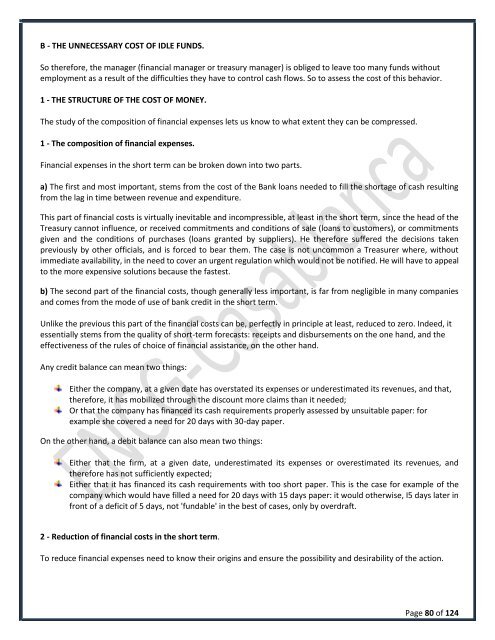Optmization of Treasury
This book is dedicated to companies and students that wish to know about how to optimize treasury and Cash-Management.
This book is dedicated to companies and students that wish to know about how to optimize treasury and Cash-Management.
Create successful ePaper yourself
Turn your PDF publications into a flip-book with our unique Google optimized e-Paper software.
B - THE UNNECESSARY COST OF IDLE FUNDS.<br />
So therefore, the manager (financial manager or treasury manager) is obliged to leave too many funds without<br />
employment as a result <strong>of</strong> the difficulties they have to control cash flows. So to assess the cost <strong>of</strong> this behavior.<br />
1 - THE STRUCTURE OF THE COST OF MONEY.<br />
The study <strong>of</strong> the composition <strong>of</strong> financial expenses lets us know to what extent they can be compressed.<br />
1 - The composition <strong>of</strong> financial expenses.<br />
Financial expenses in the short term can be broken down into two parts.<br />
a) The first and most important, stems from the cost <strong>of</strong> the Bank loans needed to fill the shortage <strong>of</strong> cash resulting<br />
from the lag in time between revenue and expenditure.<br />
This part <strong>of</strong> financial costs is virtually inevitable and incompressible, at least in the short term, since the head <strong>of</strong> the<br />
<strong>Treasury</strong> cannot influence, or received commitments and conditions <strong>of</strong> sale (loans to customers), or commitments<br />
given and the conditions <strong>of</strong> purchases (loans granted by suppliers). He therefore suffered the decisions taken<br />
previously by other <strong>of</strong>ficials, and is forced to bear them. The case is not uncommon a Treasurer where, without<br />
immediate availability, in the need to cover an urgent regulation which would not be notified. He will have to appeal<br />
to the more expensive solutions because the fastest.<br />
b) The second part <strong>of</strong> the financial costs, though generally less important, is far from negligible in many companies<br />
and comes from the mode <strong>of</strong> use <strong>of</strong> bank credit in the short term.<br />
Unlike the previous this part <strong>of</strong> the financial costs can be, perfectly in principle at least, reduced to zero. Indeed, it<br />
essentially stems from the quality <strong>of</strong> short-term forecasts: receipts and disbursements on the one hand, and the<br />
effectiveness <strong>of</strong> the rules <strong>of</strong> choice <strong>of</strong> financial assistance, on the other hand.<br />
Any credit balance can mean two things:<br />
Either the company, at a given date has overstated its expenses or underestimated its revenues, and that,<br />
therefore, it has mobilized through the discount more claims than it needed;<br />
Or that the company has financed its cash requirements properly assessed by unsuitable paper: for<br />
example she covered a need for 20 days with 30-day paper.<br />
On the other hand, a debit balance can also mean two things:<br />
Either that the firm, at a given date, underestimated its expenses or overestimated its revenues, and<br />
therefore has not sufficiently expected;<br />
Either that it has financed its cash requirements with too short paper. This is the case for example <strong>of</strong> the<br />
company which would have filled a need for 20 days with 15 days paper: it would otherwise, I5 days later in<br />
front <strong>of</strong> a deficit <strong>of</strong> 5 days, not 'fundable' in the best <strong>of</strong> cases, only by overdraft.<br />
2 - Reduction <strong>of</strong> financial costs in the short term.<br />
To reduce financial expenses need to know their origins and ensure the possibility and desirability <strong>of</strong> the action.<br />
Page 80 <strong>of</strong> 124


